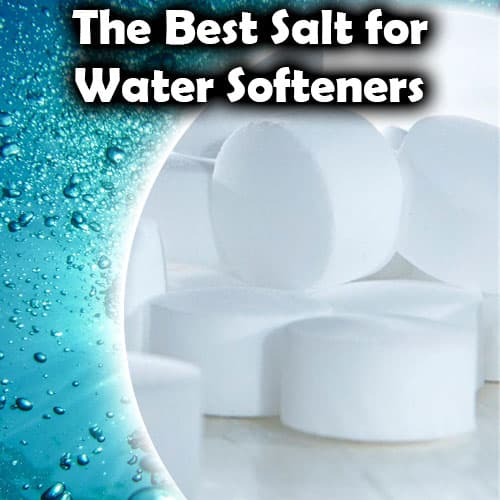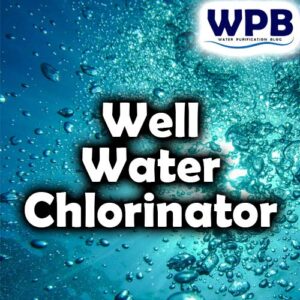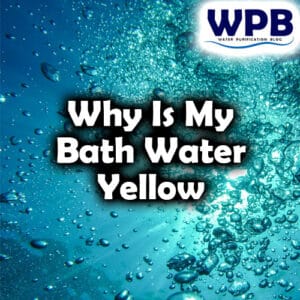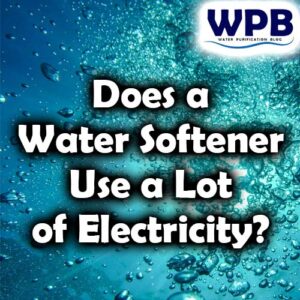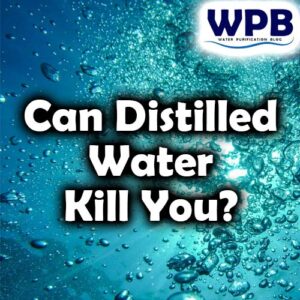Water softeners are essential systems that help remove hard water minerals, such as calcium and magnesium, from your household water supply.
These minerals can cause a variety of problems, including buildup on pipes and fixtures, discolored laundry, and dry skin and hair.
A water softener works by using a process called ion exchange, in which positively charged mineral ions are replaced with negatively charged ions, typically sodium or potassium.
Table of Contents
Using only the best water softener salt in your water softening system can provide it’s reliable operation, and a safe source of soft water for your whole home.
Water Softener Salt: The Basics
Water softener salt is a type of salt that is used to generate brine, which is used to exchange hard water minerals for soft water minerals.
The brine is generated by dissolving the salt in water, which creates a solution that is then used to exchange minerals in the water softener’s resin tank.
The brine is stored in a brine tank, which is separate from the resin tank.

Water softener salt comes in several forms, including solar salt, evaporated salt pellets, and rock salt.
Solar salt is made by evaporating seawater, while evaporated salt pellets are made by evaporating saltwater that has been extracted from underground salt mines.
Rock salt is simply mined salt in its natural form.
Salt quality
One of the key components of water softening process is the use of salt. But not just any salt will do.
The quality of the salt you use in your water softener can have a significant impact on the efficiency and performance of your system.

Read on, and explore the importance of using high-quality salt in your water softener to avoid salt bridging, as well as the different types of salt available and how to choose the right one for your needs.
Why is only the best water softener salt acceptable?
As we mentioned earlier, a water softener works by using a process called ion exchange to remove hard water minerals from your household water supply.
The ion exchange resin, which is a bead-like substance that is packed into the water softener tank, attracts and traps positively charged mineral ions and replaces them with negatively charged ions of sodium or potassium.
The ion exchange resin eventually becomes saturated with calcium and magnesium ions, and can no longer effectively remove these minerals from the water supply.
This is when the water softener needs to be regenerated, which is the process of restoring the water softener’s operatiing capacity.
Salt is used to regenerate the ion exchange resin in most water softeners
The salt is not used directly, but through a saturated brine solution that forms in the brine tank. An exactly determined volume of water dissolves the salt until saturation point.
During the regeneration process the brine solution is used to flush out the calcium and magnesium ions from the resin beads and replace them with sodium or potassium ions.
The quality of salt you use can greatly influence the efficiency of this process.
This is why only the best water softener salts are recommended.
The Importance of the best water softener salt
Not all salt is created equal. The quality of the salt you use in your water softener can have a significant impact on the efficiency and performance of your system.
Low-quality salt can contain impurities, such as dirt and debris, which can clog the water softener and reduce its efficiency.
In addition, low-quality salt may not dissolve as easily as higher-quality salt, which can also cause clogging and reduce the effectiveness of the regeneration process.
Using only the best salt for water softeners in your water softener can help to ensure that the ion exchange resin is effectively cleaned and regenerated, resulting in improved water quality and performance of the system.
Types of Salt Available for Water Softeners
One of the key components of a water softener is the salt , and its quality used in the regeneration process.
There are several different types of salt available for water softeners, each with its own set of pros and cons, here are the different types of salt available for water softeners and what makes them unique.
Sodium Chloride (Table Salt)
Sodium chloride, also known as table salt, is the most common salt type used in water softeners. It is a readily available, affordable option that is easily dissolved in water, making it an ideal choice for water softener regeneration.
Sodium chloride is also effective in removing hard water minerals and improving water quality.
However, sodium chloride can have some drawbacks. For one, it can increase the sodium content of the water, which can be a concern for individuals on a low-sodium diet.
Additionally, excessive use of sodium chloride can lead to a buildup of sodium in the soil, which can be harmful to plants and vegetation.
Potassium Chloride
Potassium chloride is a type of salt that is becoming increasingly popular as an alternative to sodium chloride. It works in much the same way as sodium chloride, but it does not increase the sodium content of the water.
This makes it an ideal choice for individuals on a low-sodium diet or for those who are concerned about the environmental impact of excessive sodium use.
Another advantage of potassium chloride is that it is a naturally occurring mineral, making it a more environmentally friendly option compared to sodium chloride, which is often produced through mining and refining processes.Potassium chloride is also readily available and affordable, making it a convenient choice for many homeowners.
Solar Salt
Solar salt is a type of salt that is produced through the evaporation of seawater. It is a natural, renewable resource that is readily available in coastal regions. Solar salt is known for its high purity and low moisture content, making it an ideal choice for water softener regeneration.
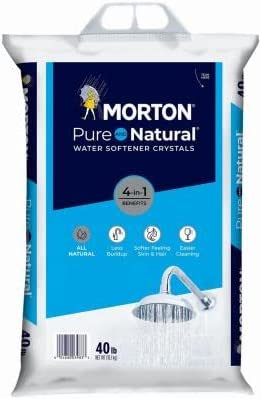
Morton Pure AND Natural Water Softening Crystals, 40 Pound bag
- Morton solar salt water softening crystals
- Harvested naturally from salt water
- Works in all water softeners
One of the benefits of solar salt is that it is a more environmentally friendly option compared to sodium chloride and potassium chloride, as it does not require any mining or refining processes. Additionally, solar salt is often more affordable than potassium chloride, making it a cost-effective option for many homeowners.
Rock Salt
Rock salt is a type of salt that is produced through the mining of underground salt deposits. It is a commonly used type of salt for water softeners, as it is readily available and affordable.
However, rock salt crystals can be less pure than other types of salt, and it often contains impurities such as dirt and other minerals.
These impurities can cause build-up in the water softener, reducing its efficiency over time.
Pellet Salt
Pellet salt is a type of salt that is formed into small, cylindrical pellets. It is a convenient option for water softener users, as the pellets are easy to handle and store.
Pellet salt is also known for its high purity and low moisture content, making it an effective choice for water softener regeneration.
One of the benefits of pellet salt is that it is a more compact option compared to other types of salt, making it easier to store in smaller spaces.

Who am I?
I am working as a water treatment technical manager and I have more than 25 years of practical experience in water purification.
Water purification expert
After many years of experience in water purification, I want to share some of my knowledge and get people to know the real importance of water quality.
Water purification and water treatment are very complex themes, so it is important to explain them in an easy-to-read way.
On this blog, you will find many understandable, easy-to-read information about water purification.
I hope you enjoy it, find some useful information, and thank You for reading.
More info on my work and my expertise on water purification can be found on my LinkedIn profile.

